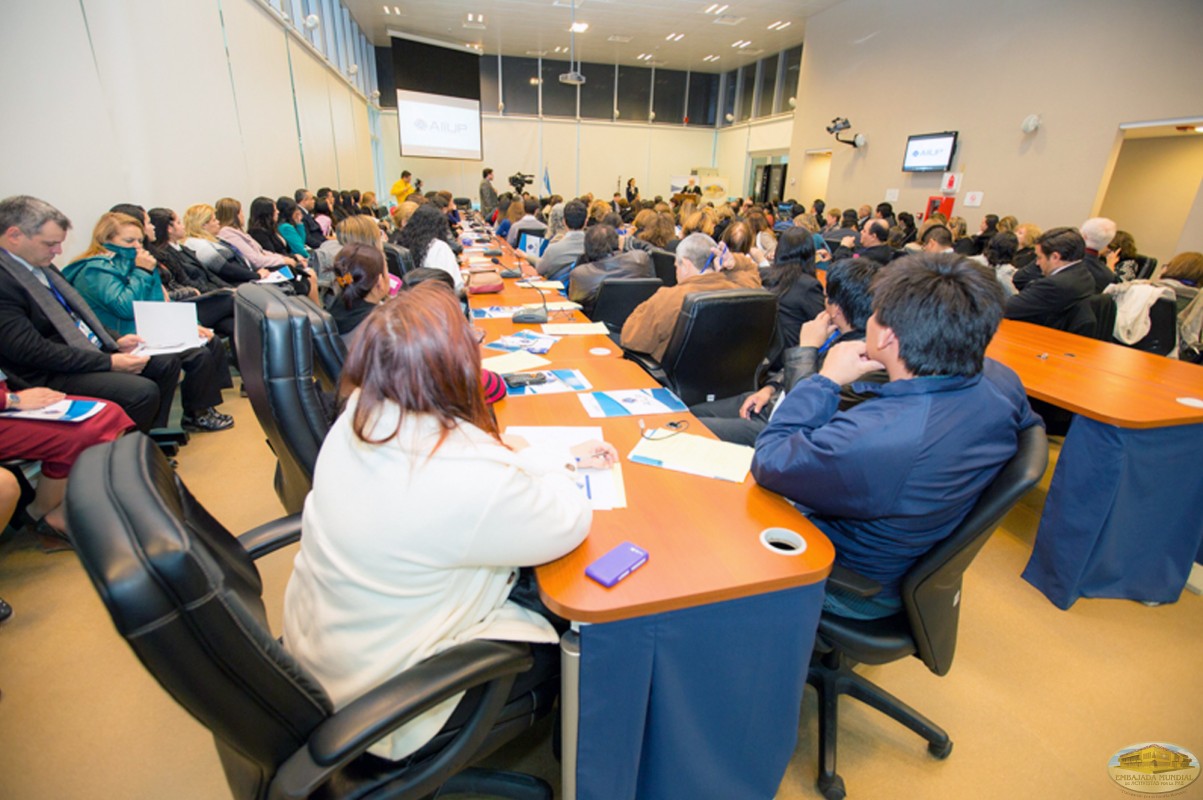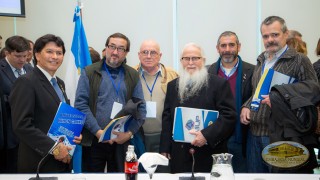University partnerships in the Chamber of Representatives of the Nation
The Honorable Chamber of Representatives of Argentina hosted the III International Seminar: Challenges of Higher Education in Human Development and Society, with the subject “Values in the Development of Professional Competitions” promoted by the Global Embassy of Activists for Peace (GEAP) through the International University Alliance for Peace (ALIUP).
This Seminar is inspired by the need to offer opportunities for reflection and experiences oriented to the promotion of human and social values that allow for the development of professional competency and the sharing of good practices to strengthen and deepen a culture of peace.
Last July 3, 2015, personalities of the political and judicial fields, academic authorities, teachers of different educational levels and representatives of maximum houses of study of the Republic of Argentina, together with directors of the GEAP and coordinators of ALIUP, developed this International Seminar to debate a subject that pertains to everyone: peace, Human Rights, and the integral formation of the human being, from the theme of Higher Education.
More than 200 people, among them 150 teachers from the province of Chaco and 54 representatives from 32 universities in the country, participated in this academic meeting; a sharing of experiences and projects for the development of professional competencies based on human values.
To open the Seminar, Dr. Dionisio Ortego, Dean of the Nihon Gakko University of Paraguay, gave words of welcome to those present and then began the presentation.
Peace as education for the full development of the human being

In his speech, Dr. William Soto, Global Ambassador of the GEAP and promoter of ALIUP, spoke of the Study for Peace in the formative process of the integral human being; through this subject he made an analysis of the determining role of the educational system to build peace or provoke war, and argued for the ideal model for integral formation.
«Education should be a continuous process of growth for improvement of the human being. Therefore, a curricular redesign is essential in response to current contexts. The educational model must be integral and holistic for the development of the human being in fullness and their harmonious integration with nature and with their neighbor.». (Read full speech)
On his part, Dr. Luis Verdún, Representative of the province of Chaco, indicated what he considers to be the challenge for the inclusion of education for peace, and in turn emphasized its relevance for the fulfilled life of the people.
«Perhaps the great challenge, apart from the rapprochement between the Ministry of Education, universities and institutes of teacher education, is surely the approach as a transversal axis in educational programs of the subject of education for peace… It is impossible to achieve the objective and the purpose of the happiness of the person, if the person has no peace. If there is not inner force that moves it in those values… It seems to me that the objective of the ALIUP is a entirely praiseworthy objective, is a completely attainable goal.».

Another essential aspect for the formation in values was highlighted by the Senator from Paraguay, Blanca Fonseca, in her speech on Human Rights as essential portions for democratic and human coexistence.
«Education in Human Rights is key, because a citizen, a citizenship, who ignores their rights, cannot defend them. In Paraguay, we are fighting from the House of Senators, I would say from the Human Rights Commission, to implement the education on Human Rights as a curriculum.».
In this same theme of education for peace, Professor Enrique Robles, Secretary of the Federation of National University Teachers (FEDUN) said: “The peace of the world is a tributary of the state of the rights of peoples… Consolidating social peace is the purpose of the humanism of our day. It is essential, then, to develop a program in the formation of values with specific curricular contents for our humanistic schools, first of all.”
The right to education in the context of confinement
Dr. Viviana Ceverino, coordinator of the University Educational Program in the Context of Confinement (PEUCE), Faculty of Philosophy and Letters of the National University of Cuyo, province of Mendoza, shared her experience on Education for social peace, especially the importance of comprehensive training in conditions of imprisonment:
«Education is aimed at achieving the full development of the human personality. This right is not lost by any citizen because they are in deprivation of liberty… Therefore, we consider that education in the context of confinement must be only one that is already contemplated in the National Education Law. In the National Education Law 26.206 that was passed in 2006… We are sure that the promotion of education in the context of confinement contributes to the Education for Peace».

The minor is not a minor problem
The speaker Carlos Parma, House Judge of the Criminal Court of Minors of Mendoza, developed the subject: “The minor is not a minor: A contribution to hope, pity and peace in vulnerable children in conflict with the law,” through which he indicated the characteristics of the process for peace.
«... Knowing that the process for peace is a process of empathy, it is a process of help, it is a process of tolerance. In conclusion, if we want a better world, we have to be better, and to be better we need to be in a world of equality, where we see the fellow citizen not as a threat, but as a promise and a hope.».
Understanding peace for teacher education
In sequence of the cycle of presentations, Dr. Rafael Galeano of the Pedagogical University of Buenos Aires, made a reflection of the understanding of peace for the teacher formation:
«We are interested in thinking of peace not as a noun, not as a state, but as a verb, as an action. The subjective disposition is different of the person who reflects on peace in terms of action, activity, things that can be done with peace; and not of a receptive, passive state of absence of war».
For her part, Dr. Ana Maria Luzardo, Academic Secretary of Humanities and Science at the National University of Jujuy, shared a project that this house of higher studies develops, regarding a free subject matter of culture studies toward peace, and urged the teachers and academic authorities to implement this study in all universities.
Time of crisis to promote building peace
Rafael González, president of the RNV group, University of Aconcagua, province of Mendoza, made his presentation on “The transformation of reality through leaders” in which he stated:
«Higher Education, in this crisis of values of which we have spoken of, has a huge challenge. First, to educate professionals who are committed to change their reality for good, for the good of all, without selfishness, with solidarity; because if you think for yourself, we are lost. Secondly, the students: the students must analyze their reality and take an active part within it in order to change it».

In consideration of this crisis of values, Professor José Luis Imaín, Secretary of the Federation of National University Teachers (FEDUN) and representative of the University of Tucuman, said:
«Hopefully there could be more teachers who ignite within their chest the flame of peace as superior social good for what we are living today… I believe that this time of crisis, and the word ‘crisis’ has the same root as that of ‘grow’. So this time of crisis, Dr. William, must be a time of growth, growth in passion, commitment and development for peace».
To conclude the discussion, the nation representative of the Republic of Argentina, David Oporto, said: “Our continent has lived a hard history to achieve peace. The nineteenth century was a century of constant wars through which the current nationalities were built… Fighting for peace in our continent is not an extravagance. It is an objective of a concrete program.”
A commitment for social transformation
Teachers, academics, and other authorities confirmed their alliance with ALIUP and renewed their commitment to work for peace, either through educational registration or with independent actions that contribute to the integral formation of the human being.
Teachers, academics, and other authorities confirmed their alliance with ALIUP and renewed their commitment to work for peace, either through educational registration or with independent actions that contribute to the integral formation of the human being.




